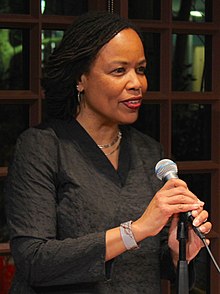Saidiya Hartman
Appearance

Saidiya Hartman (born 1961) is an American writer and professor.
Quotes
[edit]- What I remember and where I start is with the detail that is the equivalent of the punctum, the moment of a life, the shape of an object, the darkness of a room, that solicits me, most often because it represents an opening or a detour.
- On her writing process in “INTERVIEW WITH SAIDIYA HARTMAN” in The White Review (September 2019)
- There are these three spaces or architectures that are absolutely foundational to my work: the Atlantic, the hold, and the circle. And I think that the circle is a central figure when trying to describe black radical imaginaries and anti-slavery philosophy…
- On her work in “INTERVIEW WITH SAIDIYA HARTMAN” in The White Review (September 2019)
- One of the fundamental ethical questions/problems/crises for the West: the status of difference and the status of the other. It's as though in order to come to any recognition of common humanity, the other must be assimilated, meaning in this case, utterly displaced and effaced: "Only if I can see myself in that position can I understand the crisis of that position." That is the logic of the moral and political discourses we see everyday - the need for the innocent black subject to be victimized by a racist state in order to see the racism of the racist state. You have to be exemplary in your goodness.…
- On the status of the “other” in “THE POSITION OF THE UNTHOUGHT” in Qui Parle (Spring/Summer 2003)
- The book is a meditation on memory, on memory and history, written in the form of a travelogue. But the journey through time and space is a device, a vehicle, a formal means to exist in the physical landscape of slavery and to embody that history and to carry it...
- On her book Lose Your Mother in “Fugitive Dreams of Diaspora: Conversations with Saidiya Hartman” in Anthurium: A Caribbean Studies Journal (June 2008)
Quotes about Saidiya Hartman
[edit]- Speaking at an event celebrating Christina Sharpe's new book In the Wake, Saidiya Hartman remarked that "care is the antidote to violence." Her words offer a potentially powerful feminist frame for abolition. Effective defense campaigns provide thousands of people with opportunities to demonstrate care for criminalized individuals through various tactics (including letter writing, financial support, prison visits, and more).
- Mariame Kaba, We Do This Til We Free Us (2021)

